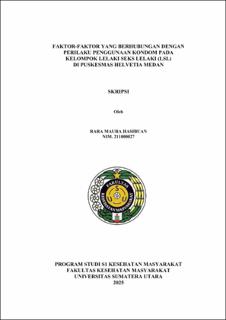Faktor-Faktor yang Berhubungan dengan Perilaku Penggunaan Kondom pada Kelompok Lelaki Seks Lelaki (LSL) di Puskesmas Helvetia Medan
Factors Associated With Condom Use Behavior Among Men Who Have Sex With Men (MSM) at Helvetia Public Health Center in Medan

Date
2025Author
Hasibuan, Rara Maura
Advisor(s)
Bukit, Dhani Syahputra
Metadata
Show full item recordAbstract
Condom use behavior refers to an individual's habit of maintaining sexual health by choosing to use condoms during sexual intercourse. This behavior includes an understanding of the importance of condom use, consistency in its use, and adherence to safe sex practices. Condom use behavior is influenced by a person’s knowledge and attitude. However, knowledge and attitude alone are not sufficient to shape or change this behavior. Other factors such as ease of access to condoms and peer group influence also play a role. These factors can contribute positively or negatively to condom use behavior within a community. The objective of this study is to analyze the factors associated with condom use behavior Among Men Who Have Sex with Men (MSM) at Helvetia Public Health Center, Medan. This research employed a quantitative approach with a cross-sectional design. The sampling technique used was non-probability sampling (purposive sampling), involving 83 respondents. Data were analyzed using univariate and bivariate analysis with the chi-square statistical test. The results showed no significant relationship between knowledge and condom use behavior among MSM (ρ = 0,278). However, there were significant relationships between attitude (ρ = 0,000), condom availability (ρ = 0,001), and peer group influence (ρ = 0,011) and condom use behavior. These findings indicate that attitude, access to condoms, and social support play a crucial role in shaping safe sexual behavior among MSM. It is expected that MSM will continue to use condoms as protection against sexually transmitted infections (STIs). Improving knowledge, fostering positive attitudes, ensuring condom accessibility, and strengthening peer support are essential to promoting safer sexual practices.
Collections
- Undergraduate Theses [3412]
